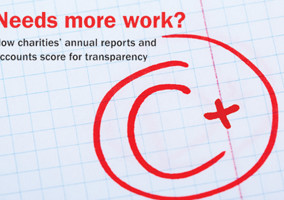The Charity Finance Group has said it is concerned about proposed changes to the Charities SORP, which include naming significant donors and adding new measures of fundraising and administration costs.
The Charities SORP (Statement of Recommended Practice) is the financial guidance which governs charity accounts. The SORP Committee, which is run jointly by the Charity Commission for England and Wales and the Office of the Scottish Charity Regulator, is currently consulting on the next incarnation of the SORP, which it expects to take effect for financial years beginning 1 January 2019.
The proposals include:
- Identifying any material donations from individuals, companies or government by the donor’s name and the amount given;
- Reintroducing a key facts summary with figures such as total income, charitable expenditure and charitable expenditure as a proportion of total income;
- Abolishing the principle of support costs, to be replaced by more explicit definitions of administrative and fundraising costs;
- Introduction of a third tier of reporting for only the largest charities with disclosures not required by other charities.
Lack of context
Speaking to Civil Society News, CFG’s policy and public affairs officer Heather McLoughlin said the proposals place too much emphasis on disclosure of sensitive financial data without a narrative behind to provide context.
“We are quite concerned about the proposals. Our main concerns are that, firstly, they seem to be a reaction to Kids Company-style media issues, and secondly that they seems to be adding an extra regulatory burden.
“We’re worried that the SORP is going to become too complex, especially for the smaller end of the charity sector.”
She warned that disclosing the names of donors could be breach of privacy, and that it could discourage them from making donations, while she said that the proposal for a key facts summary could lead to “an overly simplistic understanding of charities”.
On disclosures of fundraising and administrative costs, she said: “There is no ‘one size fits all’ for charities’ spending, and charities are going to have to spend differently to achieve their aims. We are worried there will be unfair comparisons.
“For example, a charity that handles very sensitive data on vulnerable children is obviously going to have to spend an exceptional amount on things like IT security and DBS [Disclosure and Barring Service] checks, compared to other charities that maybe don’t.
“And as we’ve seen with media reporting, charities can all be tarred with the same brush.”
Related articles











